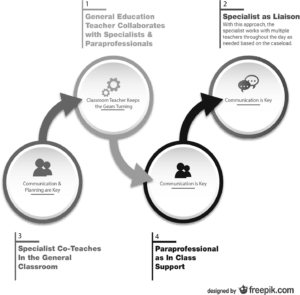Thursday, January 19, 2017

1 Collaborative Roles in the Classroom
Given the magnitude of demands placed on classroom teachers today, they can become overwhelmed with the task of trying to meet the needs of a heterogeneously grouped co-taught classroom. Whereas some content area teachers are skilled in working with students with disabilities, and some may even have certification in special education, we cannot assume a general education teacher has that knowledge and background. Even when a teacher “can” meet the demands of today’s’ rigorous standards as well as the needs of their students, the opportunity to collaborate with specialists to meet student needs significantly increased the possibility of increased student success.
3 Specialist Co-teaches in the General Classroom
Special education teachers can play a critical role in helping classroom and content area teachers analyze the standards based lesson plan and design lessons that support all learners in the classroom. State Standards places new demands on content area teachers as well as special education teachers. It’s important that both teachers take an active role in professional development that enables the special education teacher to become skilled in the content, as well as enabling the general education teacher to understand how to differentiate lesson plans and deliver Specially Designed Instruction (SDI) when necessary.
2 Specialist as Liaison
At times, the specialist acts as ‘consultant’ to the general classroom teachers. The special education ‘consultant’ works primarily outside the classroom with the general education teacher and may work directly in classrooms as needed. The general classroom teacher in this situation makes most, if not all, of the classroom adaptations, accommodations, and modifications, using the IEP and the special educator as a guide and resource.
4 Paraprofessional as in-Class Support
If a paraprofessional is assigned to the general classroom, the special education teacher or specialist works closely with both the paraprofessional and the general classroom teacher.
I’d like to close this article with words from a paraprofessional that I loved dearly. She was an amazing paraprofessional and a beautiful human being. I’m grateful to have worked with Ginger Davis.
A Paraprofessional’s Point of View
Teamwork between the paraprofessional and the classroom teacher is an essential ingredient to a successful inclusion classroom. When a paraprofessional is assigned to a class, he or she should be seen as a part of the solution and not as an intrusion. Ideally, the paraprofessional and the classroom teacher have some common planning time to discuss upcoming assignments, progress of students, and methods to help the students succeed. Without this time, it is difficult to establish a strong working relationship; however, the relationship can still be beneficial.
Paraprofessionals can be valuable resources in the classroom. They can work in class with students who are having difficulty understanding the information, provide notes for those students who are unable to take comprehensive notes during class time, and provide help with test and assignment modifications for students with learning disabilities.
Student follow-up is especially important to meet IEP requirements and promote success. Often, the paraprofessional can follow-up in the resource room as well as in-class. Paraprofessionals can support the classroom teacher by answering the questions of all students.
Paraprofessionals are an integral and important part of the classroom team. They are happy to contribute whatever they can to add to the success of all the students. If the teacher is accepting of the paraprofessional’s presence, then the students will also accept it as normal and will consider him or her as the extra, valuable resource he or she is.
~ Ginger Davis
Londonderry High School
Copyright © 2000-2013 Susan Fitzell & Aim Hi Educational Programs, LLC
#####
Susan Fitzell, M. Ed, CSP, is a nationally recognized presenter, author of nine books for teachers, trainers, and parents, an educational consultant, and CEO of Aim Hi Educational Programs, LLC. As an independent consultant and coach, Susan offers the personalization, continuity, and consistency necessary for true change in any organization. She works side by side with teachers, school administrators, and business leaders as a coach and trainer, employing Brain Power strategies that take learning to the next level.
Disclosures and Permission to Reprint
For more information, visit Susan's website at www.susanfitzell.com or click here for more great articles.